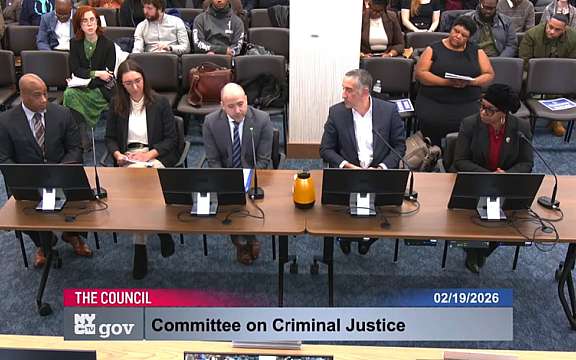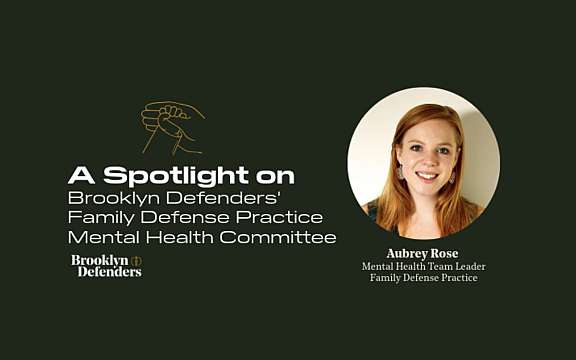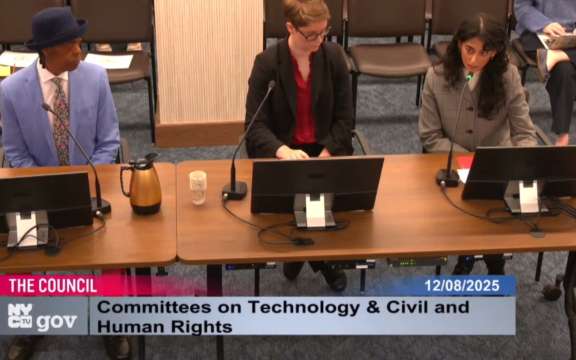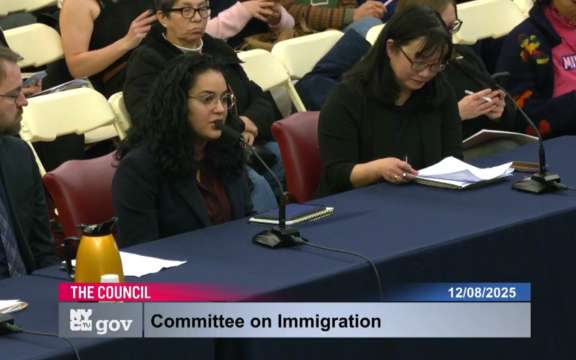BDS Testimony Presented Before the New York City Council Committee on Education and Committee on Health Regarding School Reopening
TESTIMONY OF:
Anna Arkin-Gallagher
Supervising Attorney, Education Practice
BROOKLYN DEFENDER SERVICES
Presented Before
The New York City Council Committee on Education and Committee on Health
Oversight Hearing on Reopening NYC Public Schools: Health and Safety
October 16, 2020
My name is Anna Arkin-Gallagher. I am a Supervising Attorney in the Education Practice at Brooklyn Defender Services. Brooklyn Defender Services (BDS) provides innovative, multi-disciplinary, and client-centered criminal, family, and immigration defense, as well as civil legal services for over 30,000 people in Brooklyn every year. We thank the Committee on Education and the Committee on Health for the opportunity to provide testimony regarding the reopening of New York City schools.
BDS’s Education Unit delivers legal representation and informal advocacy to our school-age clients and to parents of children in New York City schools. Many of the people we serve are involved in the criminal legal or family regulation systems. In addition, a significant number of the students we work with qualify as “over-age and under-credited” and have been retained at least one grade. More than half of the students we work with are classified as students with disabilities. As an interdisciplinary legal and social work team, we work to improve our clients’ access to education, and a significant portion of our advocacy relates to special education, school discipline, reentry and alternative pathways to graduation.
This has been a school year unlike any other, and handling logistics for a school system of 1.1 million students is no easy task. Parents and students we work with have praised teachers, paraprofessionals, and school administrators for the work they have undertaken to provide educational services during this very difficult time. But many families have faced and continue to face difficulties, and we remain deeply concerned that the Department of Education’s school reopening threatens to exacerbate the many inequities that have long existed within the City’s education system. Indeed, over six months into the pandemic we continue to work with families who remain almost completely unable to access the educational services to which they are entitled by law.
Int. 2058 and Int. 2104
BDS supports Int. 2058, which calls for the DOE to report each week data regarding attendance during periods of remote learning, disaggregated by school, school district, grade, race, Individualized Education Program (IEP) status, and multilingual or English language learner status. We are hopeful that a more rigorous set of reporting requirements for remote-learning attendance will help pinpoint more precisely the reasons why DOE has been unable to deliver educational services to everyone. The data that has been released thus far shows glaring inequities in the way that educational services have been delivered during this pandemic, and that schools serving primarily Black or Latinx students were far more likely to report low student attendance during the spring and summer of 2020 than schools serving primarily white students.1 Thus we welcome the frequent and detailed reporting mandated by Int. 2058, and are hopeful that more rigorous reporting of data can ensure that resources are targeted to support those schools and communities that need them most.
BDS also supports Int. 2104, which mandates the reporting of metrics regarding remote learning. In particular, requiring the collection and reporting of data regarding the provision of special education instruction and related services is essential, as parents of students with disabilities have reported to us that they fear their children are not getting all the services they are entitled to, and are falling further behind.
I want to take the opportunity to highlight some of the specific issues that the families we serve are facing during this period of remote learning, and include below some recommendations for strengthening both Int. 2058 and Int. 2104 based on what we have learned.
Students Attending School in Jails and Detention Facilities Continue to Struggle to Access Remote Learning.
We appreciate that Int. 2104 provides for both the reporting of “[s]teps the department took before and during the relevant reporting period to ensure that all students in juvenile facilities received remote instruction,” as well as “[a] detailed description of the outreach and communication the department engaged in before and during the relevant reporting with parents of students in juvenile facilities . . . .” School-aged young people in city jails and juvenile detention facilities have the right to receive educational services, but during this pandemic, they have been especially ill-served by remote learning.
However, we suggest also mandating reporting concerning the delivery of educational services to students housed in adult jail facilities. Though young people housed in adult facilities are 18 and older, and thus are not required to attend school, they still have the right to receive educational services through the end of the school year in which they turn 21.2 During the first months of the pandemic, students on Rikers Island received no educational services whatsoever. Currently students on Rikers Island are supposed to have access to some educational services – either via tablets or with paper packets – but still have no access to synchronous instruction, and can only communicate with their teachers through a phone-based hotline or through the chat function on their tablets. Some of the people we serve on Rikers Island have reported being unaware of the school services available to them. Therefore, we believe that the DOE should also report publicly on efforts to ensure that students in adult facilities have access to educational services.
Concerns Regarding Increased Reporting of Educational Neglect
Though we support the reporting of attendance information and remote learning metrics for the reasons detailed above, we are concerned that the requirements of increased attendance reporting could have the unintended consequence of leading to the increased reporting of cases to the Statewide Central Register (SCR) with resulting investigations by the Administration for Children’s Services (ACS). Ever since New York City families began to experience the challenges of this pandemic, parents and other caregivers that we represent have experienced new ACS involvement because of remote learning delays and challenges. In many of these instances, however, the reported absences were merely the product of missing devices, technological difficulties, and internet connectivity difficulties—all issues that, under the applicable guidance, should not have prompted a referral.3
Vast racial and socioeconomic disparities exist in how ACS investigations are conducted. In New York City, Black families are many times more likely than white families to face investigations.4 We cannot overstate the extent of the harm that flows from unnecessary and invasive child welfare involvement. In our experience, ACS investigations do not fix the educational access issues, and drive a wedge between families and schools.5
Thus, we ask that the City Council work to ensure that the DOE acts as a partner with parents and caregivers who are struggling to connect their children with remote learning during this pandemic. During this time when New York City families are cut off from many other systems of support, teachers and school staff who already know and work with parents, caregivers, and students are in the best position to assess barriers to engagement with remote learning and directly support and counsel families without involving other government agencies.
Any effort to focus more on attendance must be met with a commitment to help families address the challenges of remote learning, and not simply to report families to the SCR when students are hard to reach.
Lack of Access to Technology Remains an Issue for Students in Public Schools.
I also want to highlight the major problems with lack of access to technology that remain in place, even seven months into remote learning. Many of the families we are working with still cannot access education due to the simple fact that they have lacked the technology necessary to engage in remote instruction. While we have worked with many students who have successfully received iPads or other devices from the DOE, a significant number of others still have not. The DOE’s statement at the October 16 Oversight Hearing that 77,000 requests for devices remain outstanding is deeply troubling.
What is more, in our experience, the DOE’s information about which students are still waiting for devices is not always accurate. Our office is working with multiple families where the DOE’s internal tracking system indicates a device has been delivered and the request for a device is marked as “closed,” but the student has not in fact received the device. One parent of a middle school student who our office is working with first requested a device in April. The DOE’s system showed the device had been delivered, but the family never received it. When our office confirmed that the device was supposed to have been delivered, we were instructed to fill out a technical support request indicating lack of receipt, and were told that a replacement device would be sent out over the summer. Nevertheless, over a month into a new school year, and over a half a year into remote learning, this student is still without a device.
Now that the inventory of devices is being managed by schools, schools have frequently reported being out of devices, and parents we work with often have no idea when new devices will arrive. These difficulties are stressful enough on their own terms. But they are made all the worse by the very real concerns that recorded absences from remote learning will result in ACS involvement, negative repercussions for our young clients who also face criminal matters, or other adverse consequences for parents and their children.
One parent we are working with reported that, after waiting months for an iPad that never arrived, she ultimately chose to acquiesce to the reality that her child will not be able to participate meaningfully in remote instruction. Instead, she uses her phone to connect her daughter to classes. With a slow cellular connection and limited data, her daughter is unable to interact with the teacher, but she is marked present, and—as long as the service is good enough—has at least some opportunity to listen to parts of the lesson.
Another parent has described the frustration of jumping through various hoops to try to get her daughter a device. An iPad was supposedly delivered to her house last month, but she never received it. After spending hours on hold with the DOE’s technical support hotline, she was told to expect a call back from someone who would provide her with additional instructions. That call has never come. In the meantime – with no internet at home – she can do little more than check her daughter into class so that her attendance can be counted. Quite understandably, she worries that her daughter is falling behind in school, and she is at a loss as to how to help her.
The City Council should work to ensure that DOE has the funding necessary to obtain a data-enabled device for every student who needs one. Int. 2058 should also be amended to include weekly reporting on the number of students who have requested remote learning devices but still do not have them, so that the City Council and Public Advocate – as well as members of the public – can learn on a weekly basis how many students still lack the technology necessary to access remote instruction.
Access to Remote Learning Remains a Particular Problem for Students in Temporary Housing.
Problems with access to remote learning technology have been particularly acute for those families living in Department of Homeless Services (DHS) shelters, even though students living in temporary housing were supposed to be prioritized for receiving data-enabled devices.
Our office has worked with families living in shelters who waited months to receive devices – including some families who even today do not have devices. One family our office has worked with moved into a shelter during the pandemic. Though the family has been given laptops from the children’s school, the students still cannot connect to online classes because the shelter lacks internet service. Int. 2058 and 2104 should be amended to include attendance reporting and remote learning metrics for students experiencing homelessness.
There is No Coherent Plan to Provide Educational Services to Those Students Who Lack Remote Learning Devices.
Our work with families who do not have remote learning devices has also highlighted the continued absence of a clear and coherent plan for offering instructional support to those families who cannot access remote learning. Some of the students we work with have received from their schools paper packets and worksheets to be completed in lieu of remote learning, supplemented by frequent phone contact from teachers and school staff. But other students have received minimal outreach from schools, even when they make it clear to those schools that they lack the requisite technology to connect to remote classrooms.
The DOE’s primary goal should be to ensure that all students have access to the technological devices that they need to connect to remote learning. But we also believe it is important that the DOE has plans in place to accommodate those students who are not able to connect to remote learning, so as to ensure that those students continue to have access to a meaningful education.
Conclusion
Brooklyn Defender Services is grateful to the Committee on Education and the Committee on Health for hosting this hearing and working to address this critical issue. Thank you for your time and consideration of our comments. We look forward to further discussing these and other issues that impact the people we serve. If you have any questions, please feel free to contact me at aarkingallagher@bds.org or (646) 971-2719.



